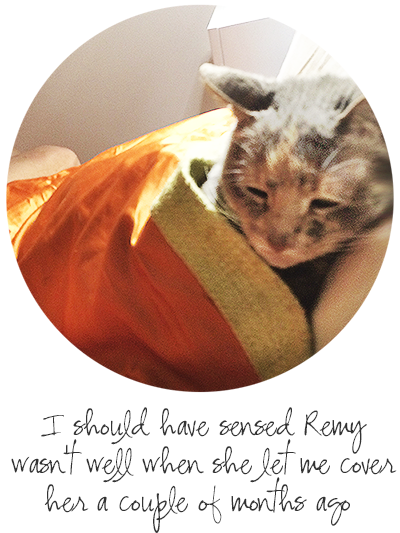
We euthanized Remy, our 14-year-old cat, this past weekend.
I met Remy in late 2001, maybe a few weeks after 9/11. Lauren (my first employee when I launched my own business in 1998, and still a dear friend) and I were walking near our office on the Upper East Side in Manhattan, when we passed a young woman cuddling a cute kitten in her arms (are kittens ever anything but cute?) We stopped to ooh and aah, and learned the kitty was up for adoption since her owner discovered she had a cat allergy.
A few hours later, I went to pick up “Remy” at the dance studio run by her now-allergic owner. That was the name I was going to give my first child, if I had a girl. I had a boy, but still loved the name. Remy was about a year old, her unofficial-looking papers reported.
She was a wonderful cat from that day forward. I remember hearing her cute faint meows for months after I brought her home, as she pitter-pattered next to my bed in the middle of the night. She eventually slept most of the night, but usually made her way to the pillows of houseguests at some point before morning. Whenever she decided to sleep between me and David, on a pillow, her purring was more soothing than any sound machine in Brookstone.
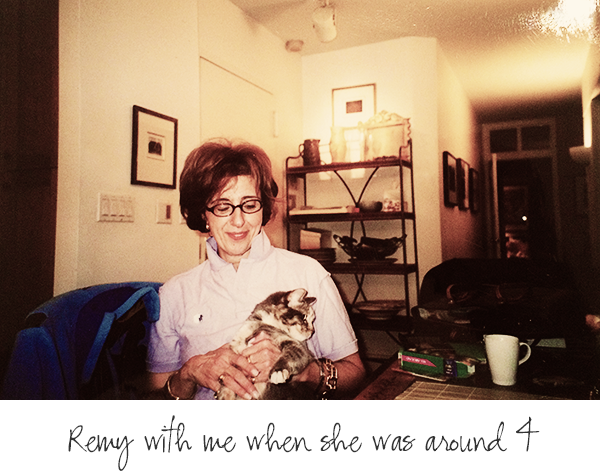
When the vet first examined Remy, he said she must have had an accident because her jaw was misshapen. It didn’t affect her ability to eat. As a matter of fact, she weighed in at 12 pounds as an adult, and Dr. Johnson advised me to put her a diet (she took after me, I guess.)
Aside from two pelvic fractures (one, the result of getting tangled up with a lightweight metal sculpture, which came crashing to the floor with her when she tried to extricate herself from it; the other, from a totally mysterious cause), Remy was healthy, content and extremely independent. She’d go about her business without fussing, and she only meowed when she wanted something she couldn’t get by herself (e.g. jumping over the high bathtub, in later years, to drink from the faucet, or opening up the door to our tiny outdoor space, where she’d bask in the sun and intently survey everything around her, as cats do so well.)
Not a cat who demanded or gave much affection, Remy would sidle up to certain people when she was in the rare mood to be held, stroked or kissed. She loved my nephew, Brian; his mother, my sister Shelley; my aunt Sylvia, and Douglas, my former husband.
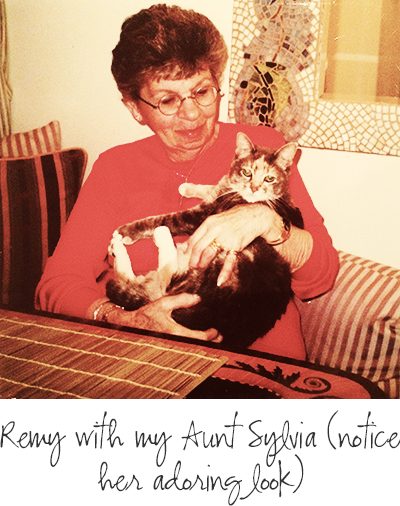
Interesting, she appealed most to people who were not cat lovers.
“She was a wonderful cat, the first animal I ever cared about,” Shelley emailed me Sunday, when I told her Remy was gone. And David, who had disliked cats, bonded with Remy as soon as he met her, around 12 years ago. He couldn’t leave the apartment without knowing where she was and that she was safe and sound. Remy was a champ at bringing out his caring side.
We brought five-month-old Rigby, a Norfolk terrier, home when Remy was about 6 years old. When he wanted to be her friend, he’d gingerly approach her to nuzzle, but Remy was not in the least bit interested. She’d hiss at him to get away. Other times, Rigby would quietly watch her approaching from the other end of the hallway, and, as she got closer, he’d suddenly turn to chase her. 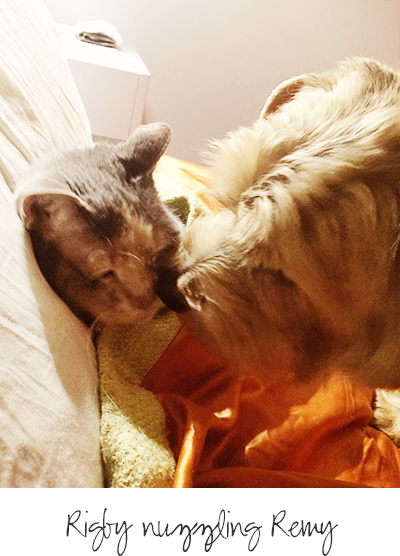 He’d bark loudly as he began his pursuit, and Remy would let out a wild scream and head for the hills. Rigby always backed off.
He’d bark loudly as he began his pursuit, and Remy would let out a wild scream and head for the hills. Rigby always backed off.
Remy stopped looking and acting like herself about two months ago, when she suddenly started to meow a great deal, first mainly at night and then quite a bit throughout the day, and lost the sparkle in her pretty green eyes. At one point, I decided she was once my father, who had similarly colored eyes, but I changed my mind and thought she was a kinder, gentler Edgar, because she had the same piercing look. For those of you who don’t “know” Edgar, he was the Mississippi (snake) charmer with whom I spent 12 years.
When we took Remy to the vet for an exam, she was down to 8 pounds, from around 11 last year. Weight loss and excessive meowing are often symptoms of hypertension and diabetes in older cats, the vet told us. Her blood workup ruled those out, but did reveal a UTI (urinary tract infection). The doctor put her on meds. The infection cleared up and the meowing subsided, but Remy’s appetite was diminishing.
Subsequent blood tests showed she most likely had a type of leukemia that, fortunately, is treatable. Although the diagnosis wasn’t fully confirmed, Dr. Cavanaugh started treatment anyway and prescribed an appetite stimulant. He also noticed that Remy had a loose tooth, which looked like it was infected, so he injected antibiotics and told us to return in 10 days to have it removed.
But something more was wrong, I thought last week, as I noticed Remy’s mouth looking more and more misshapen every day. She’d start eating but would stop within a minute. She’d approach the water bowl, but turned away. Her meowing intensified again. Perhaps the antibiotics didn’t work and the infection had worsened. At least she’d have the tooth removed on Sunday.
The moment Dr. Cavanaugh looked at Remy’s mouth Sunday morning, he knew something more was indeed wrong. Turning to me and David, he told us that Remy had an “aggressive malignant tumor” on her jawbone and began to explain our options. He’d recommend an oncologist, who would probably take xrays and a biopsy. Depending on the results, part of her jawbone could be removed, along with the tumor. However, it was likely the tumor would return in short order. “Is she in pain?” I asked, of course knowing the answer because she was trying to tell us she was in distress ever since she started meowing a couple of months ago. “Yes,” Dr. Cavanaugh answered. “But we could give her pain medication.”
At that moment, my decision was made. We needed to stop Remy’s pain, but not
with pain drugs.
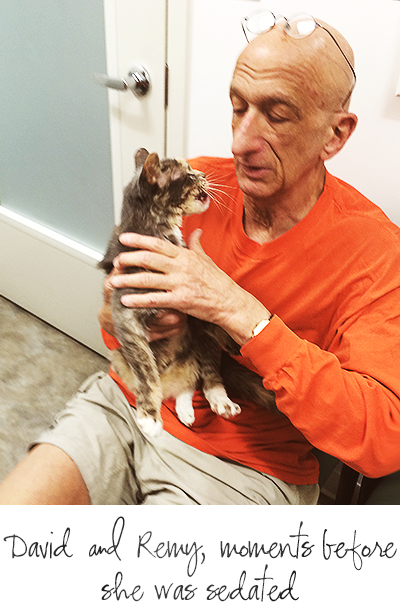
David would have prefered to take her home to prepare himself, but I couldn’t deal with that so I emailed my son, who also has a 14-year-old cat, and asked his advice. He agreed with my decision, and David also came to terms with it.
Dr. Cavanaugh gave Remy a sedative around 10:45 am Sunday, then inserted a catheter into her leg that carried the drugs to peacefully end her life. I couldn’t bear to be in the room. David told me she looked liked she was asleep. He cried, something that I’ve seen him do only once since we met, when Remy was around 2 years old.
All I could think of Sunday was Remy’s meowing during the last two months, as she tried to tell us she was in pain a great deal worse than any of us suspected. I am upset at the thought that we weren’t doing anything to help her, despite the antibiotics, appetite stimulant, leukemia drug. Although her mouth didn’t show any outward signs of cancer until last week (except, in hindsight, the loose tooth), the tumor obviously was causing her great suffering. I now realize that when she’d sit completely still, on the top of the sofa back, facing the wall, it was probably the only time she felt less pain.
My heart aches picturing her in that position and imagining what she was feeling.
Rigby, in the meantime, seems a bit lost since David and I returned to the apartment Sunday, absent Remy. He sniffed around her carrier and watched me empty the litter box and gather up her belongings. Crazy as it sounds, I think Rigby and Remy must have derived some comfort from one another, even when they fought like cats and dogs, and that they probably socialized when we weren’t home.
I wish Rigby and I could tell each other how we feel.
 I only met Paul once, at the wedding of my friend, Joanna. Paul was married to Lucy, Joanna’s twin sister.
I only met Paul once, at the wedding of my friend, Joanna. Paul was married to Lucy, Joanna’s twin sister.

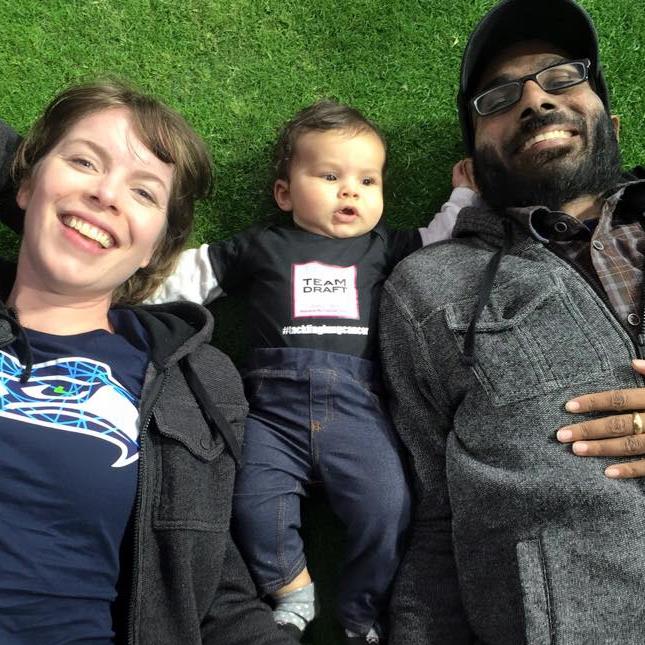

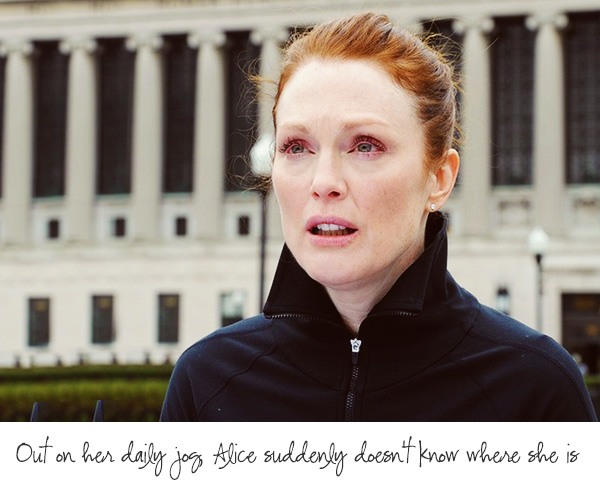
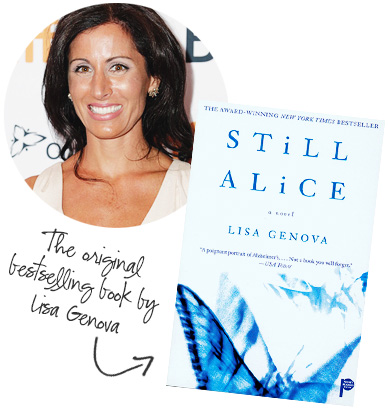
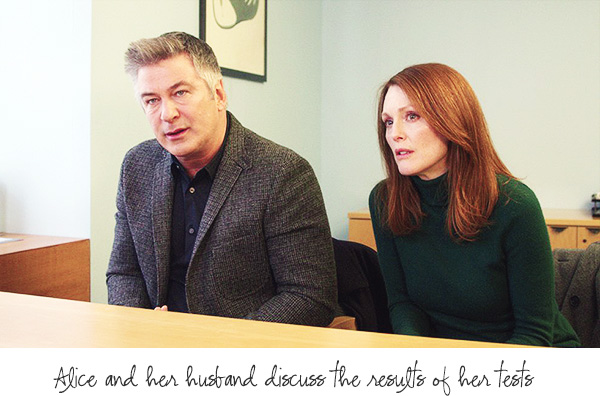
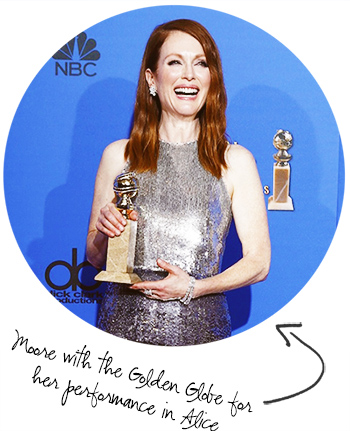 “had a hell of a time coping with the disease,” Julianne said. “One of the reasons I connected with her is that she has red hair—we look very similar.”
“had a hell of a time coping with the disease,” Julianne said. “One of the reasons I connected with her is that she has red hair—we look very similar.”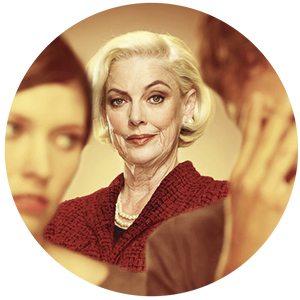
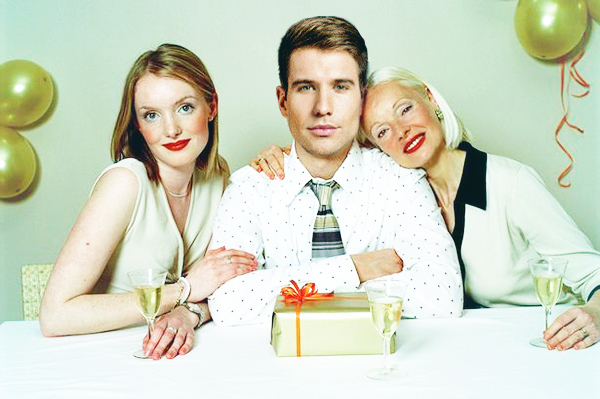
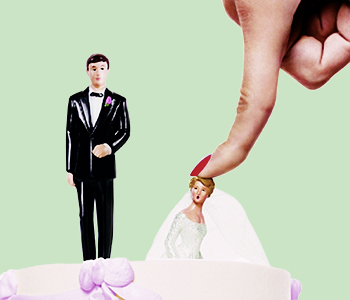 Of course, their sons all embodied perfection! I remember my usually mild-mannered, soft-spoken paternal grandmother repeatedly moaning how my uncle was “too good” for his wife, who the family dubbed “crazy.” I loved my uncle, but I assure you he was hardly “too good” for her.
Of course, their sons all embodied perfection! I remember my usually mild-mannered, soft-spoken paternal grandmother repeatedly moaning how my uncle was “too good” for his wife, who the family dubbed “crazy.” I loved my uncle, but I assure you he was hardly “too good” for her.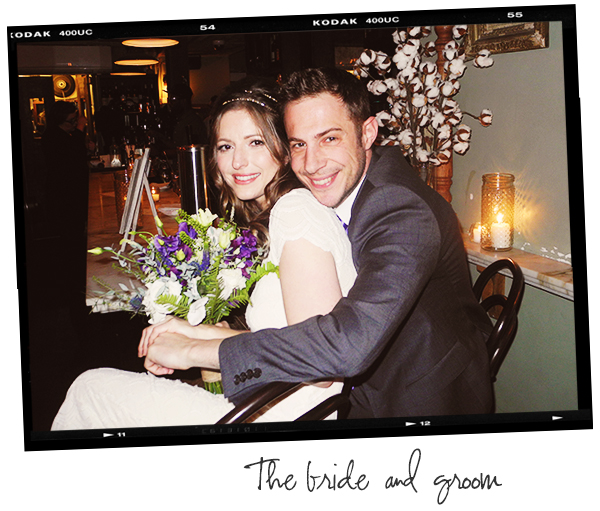
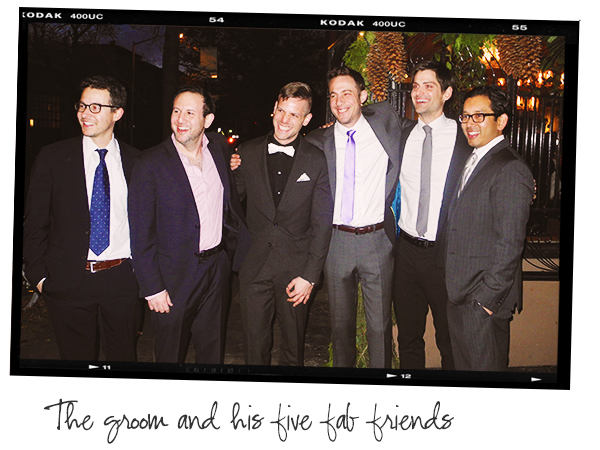
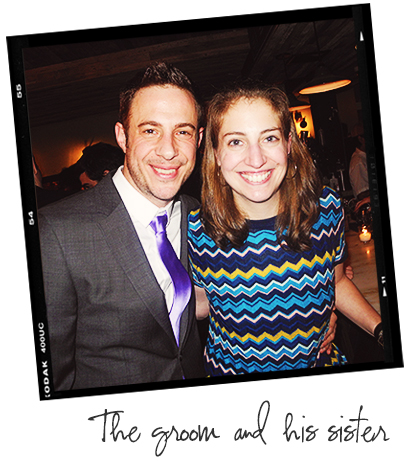
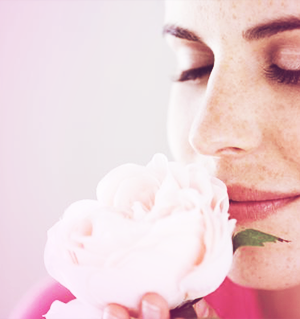
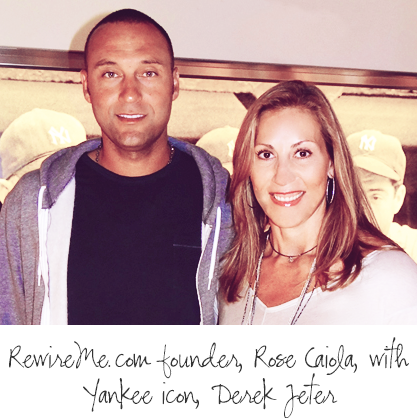 and to connect the wires that can turn on our power to happily move ahead in our lives.
and to connect the wires that can turn on our power to happily move ahead in our lives. clever and entertaining video that explores the causes and cures for stress
clever and entertaining video that explores the causes and cures for stress


 He’d bark loudly as he began his pursuit, and Remy would let out a wild scream and head for the hills. Rigby always backed off.
He’d bark loudly as he began his pursuit, and Remy would let out a wild scream and head for the hills. Rigby always backed off.

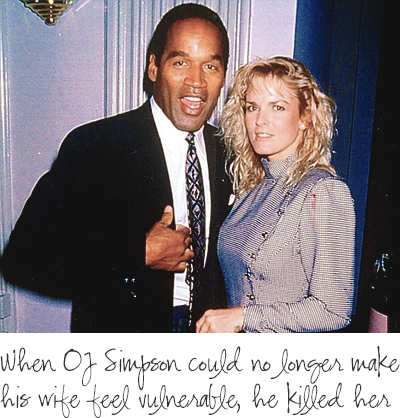 It’s consistently reported, for example, that over 85 percent of those who go through drug or alcohol rehab fail and return to their addictions. But, without help, where would the 15 percent be?
It’s consistently reported, for example, that over 85 percent of those who go through drug or alcohol rehab fail and return to their addictions. But, without help, where would the 15 percent be?
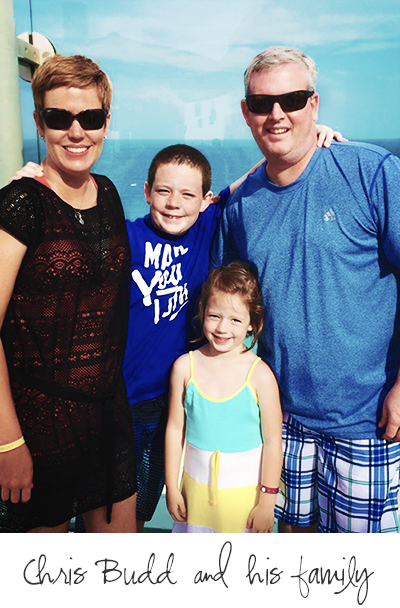

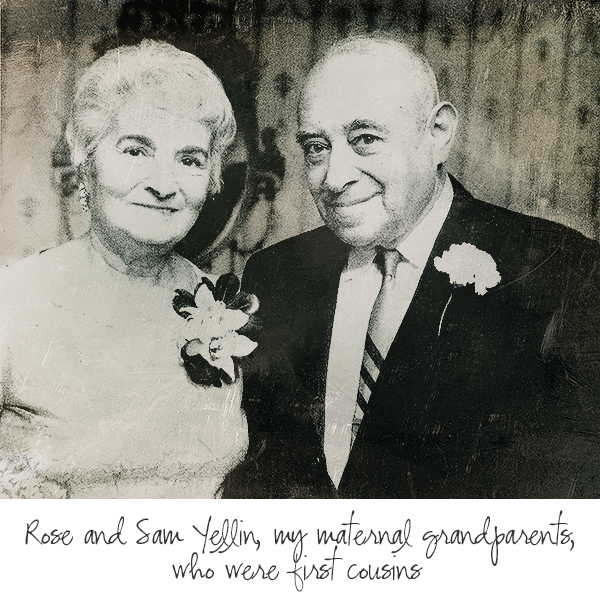
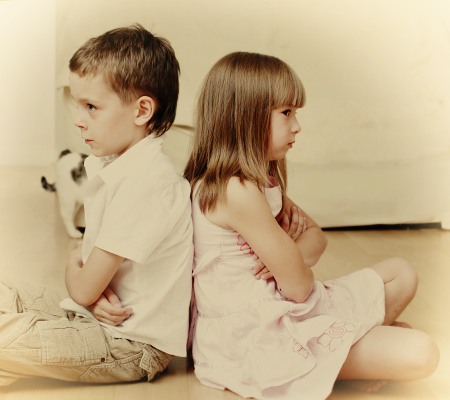 who hadn’t made the trip. Cousins clubs transcended ethnicity. Poles, Italians and Jews all benefitted from family closeness and generosity.
who hadn’t made the trip. Cousins clubs transcended ethnicity. Poles, Italians and Jews all benefitted from family closeness and generosity.